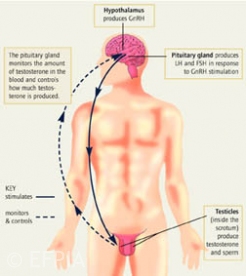Are you experiencing reduced menstruation? Do you go through months with no menstrual period? Are you having problems conceiving? Do you go through periods of hot flushes, anxiety and excessive sweating even though you are not yet in the menopausal stage? Then perhaps you are suffering from hypogonadism, a condition wherein your ovaries are not producing enough estrogen hormone.
Although hypogonadism happens more frequently to men, women like you may also suffer from this condition. The good news is that it is very much treatable with the help of some prescription drugs.
Types
There are actually two types of this disorder—primary and secondary. Women of any age may develop either type. Primary hypogonadism is normally due to ovary disorder or failure resulting from a chromosomal abnormality like Turner’s syndrome. It could also be a result of the surgical extraction of the ovaries. Primary hypogonadism is often the natural result of menopause.
The other type, secondary hypogonadism, is the consequence of pituitary gland or hypothalamus abnormality that brings about the underproduction of hormones stimulating the normal function of the ovaries. The abnormality of the hypothalamus (a part of the brain) or pituitary gland may be caused by disorders like pituitary tumor, or damage to the hypothalamus like a head injury. In rarer cases, it could also be due to sudden weight loss.
Symptoms
 The symptoms of hypogonadism in women vary depending on the age of the patients. For older women like you, symptoms range from reduced fertility which could explain why you are having a hard time getting pregnant, to reduced or absent menstruation even if you are not yet in the menopausal stage. You may also experience hot flushes, abnormal sweating, and anxiety. Your sex drive may also be very low. In rarer cases, hypogonadism causes receding pubic hair and smaller breasts.
The symptoms of hypogonadism in women vary depending on the age of the patients. For older women like you, symptoms range from reduced fertility which could explain why you are having a hard time getting pregnant, to reduced or absent menstruation even if you are not yet in the menopausal stage. You may also experience hot flushes, abnormal sweating, and anxiety. Your sex drive may also be very low. In rarer cases, hypogonadism causes receding pubic hair and smaller breasts.
For those who are in the puberty stage, their menstruation will be delayed. There is also slow or absent breast growth for young women who are affected by this syndrome. To verify that you have hypogonadism, your doctor may ask you to undergo estrogen level check-up and other tests involving your genes, blood and prolactin levels.
Treatment
Treatment of this condition may vary depending on the root cause of hypogonadism. For instance, if it is due to pituitary tumor then surgical removal of the tumor will be needed. If it is due to weight loss then you’d have to lose weight. You may also be prescribed with prescription medications like CombiPatch which replaces the estrogen that your ovaries are incapable of producing.
CombiPatch is applied to the abdominal area so that the body will be able to absorb the estrogen quickly. The patch is then replaced every 3-4 days. You have to be aware, though, that CombiPatch can cause side effects. If it’s your first time to use this patch, you have increased risks of abdominal pain, skin redness, vomiting, breast tenderness, bloating, headaches and sudden weight changes. If these effects continue, consult your doctor immediately.
Share This